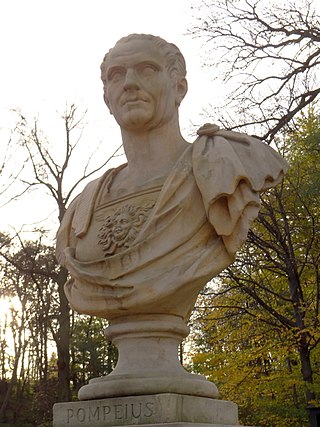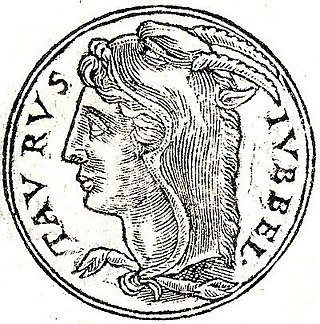Related Research Articles
The gens Acilia was a plebeian family at ancient Rome, that flourished from the middle of the third century BC until at least the fifth century AD, a period of seven hundred years. The first of the gens to achieve prominence was Gaius Acilius, who was quaestor in 203 and tribune of the plebs in 197 BC.

The gens Valeria was a patrician family at ancient Rome, prominent from the very beginning of the Republic to the latest period of the Empire. Publius Valerius Poplicola was one of the consuls in 509 BC, the year that saw the overthrow of the Tarquins, and the members of his family were among the most celebrated statesmen and generals at the beginning of the Republic. Over the next ten centuries, few gentes produced as many distinguished men, and at every period the name of Valerius was constantly to be found in the lists of annual magistrates, and held in the highest honour. Several of the emperors claimed descent from the Valerii, whose name they bore as part of their official nomenclature.

The gens Aurelia was a plebeian family at ancient Rome, which flourished from the third century BC to the latest period of the Empire. The first of the Aurelian gens to obtain the consulship was Gaius Aurelius Cotta in 252 BC. From then to the end of the Republic, the Aurelii supplied many distinguished statesmen, before entering a period of relative obscurity under the early emperors. In the latter part of the first century, a family of the Aurelii rose to prominence, obtaining patrician status, and eventually the throne itself. A series of emperors belonged to this family, through birth or adoption, including Marcus Aurelius and the members of the Severan dynasty.

The gens Junia was one of the most celebrated families of ancient Rome. The gens may originally have been patrician, and was already prominent in the last days of the Roman monarchy. Lucius Junius Brutus was the nephew of Lucius Tarquinius Superbus, the seventh and last King of Rome, and on the expulsion of Tarquin in 509 BC, he became one of the first consuls of the Roman Republic.

The gens Pompeia was a plebeian family at ancient Rome, first appearing in history during the second century BC, and frequently occupying the highest offices of the Roman state from then until imperial times. The first of the Pompeii to obtain the consulship was Quintus Pompeius in 141 BC, but by far the most illustrious of the gens was Gnaeus Pompeius, surnamed Magnus, a distinguished general under the dictator Sulla, who became a member of the First Triumvirate, together with Caesar and Crassus. After the death of Crassus, the rivalry between Caesar and Pompeius led to the Civil War, one of the defining events of the final years of the Roman Republic.
The gens Papiria was a patrician family at ancient Rome. According to tradition, the Papirii had already achieved prominence in the time of the kings, and the first Rex Sacrorum and Pontifex Maximus of the Republic were members of this gens. Lucius Papirius Mugillanus was the first of the Papirii to obtain the consulship in 444 BC. The patrician members of the family regularly occupied the highest offices of the Roman state down to the time of the Punic Wars. Their most famous member was Lucius Papirius Cursor, five times consul between 326 and 313 BC, who earned three triumphs during the Samnite Wars. Most of the Papirii who held office under the later Republic belonged to various plebeian branches of the family. Although the most illustrious Papirii flourished in the time of the Republic, a number of the family continued to hold high office during the first two centuries of the Empire.
The gens Quinctilia, also written Quintilia, was a patrician family at ancient Rome, dating from the earliest period of Roman history, and continuing well into imperial times. Despite its great antiquity, the gens never attained much historical importance. The only member who obtained the consulship under the Republic was Sextus Quinctilius in 453 BC. The gens produced numerous praetors and other magistrates, but did not obtain the consulship again for over four hundred years.
The gens Terentia was a plebeian family at ancient Rome. Dionysius mentions a Gaius Terentius Arsa, tribune of the plebs in 462 BC, but Livy calls him Terentilius, and from inscriptions this would seem to be a separate gens. No other Terentii appear in history until the time of the Second Punic War. Gaius Terentius Varro, one of the Roman commanders at the Battle of Cannae in 216 BC, was the first to hold the consulship. Members of this family are found as late as the third century AD.

The gens Minucia was an ancient Roman family, which flourished from the earliest days of the Republic until imperial times. The gens was apparently of patrician origin, but was better known by its plebeian branches. The first of the Minucii to hold the consulship was Marcus Minucius Augurinus, elected consul in 497 BC.
The gens Aelia, occasionally written Ailia, was a plebeian family in Rome, which flourished from the fifth century BC until at least the third century AD, a period of nearly eight hundred years. The archaic spelling Ailia is found on coins, but must not be confused with Allia, which is a distinct gens. The first member of the family to obtain the consulship was Publius Aelius Paetus in 337 BC.

The gens Maria was a plebeian family of Rome. Its most celebrated member was Gaius Marius, one of the greatest generals of antiquity, and seven times consul.
The gens Domitia was a plebeian family at ancient Rome. The first of the gens to achieve prominence was Gnaeus Domitius Calvinus, consul in 332 BC. His son, Gnaeus Domitius Calvinus Maximus, was consul in 283, and the first plebeian censor. The family produced several distinguished generals, and towards the end of the Republic, the Domitii were looked upon as one of the most illustrious gentes.
The gens Gellia was a plebeian family at ancient Rome, where they settled after the Second Punic War. The first of the Gellii to obtain the consulship was Lucius Gellius Poplicola, in 72 BC, but the most famous member of this gens is probably the grammarian Aulus Gellius, who flourished during the second century AD.

The gens Nonia was a plebeian family at ancient Rome. Its members first appear in history toward the end of the Republic. The first of the Nonii to obtain the consulship was Lucius Nonius Asprenas in 36 BC. From then until the end of the fourth century, they regularly held the highest offices of the Roman state.
The gens Mummia was a plebeian family at Rome. Members of this gens are first mentioned after the Second Punic War, and within a generation, Lucius Mummius Achaicus became the first of the family to obtain the consulship. Although they were never numerous, Mummii continued to fill the highest offices of the state through the third century AD.
The gens Oppia was an ancient Roman family, known from the first century of the Republic down to imperial times. The gens may originally have been patrician, as they supplied priestesses to the College of Vestals at a very early date, but all of the Oppii known to history were plebeians. None of them obtained the consulship until imperial times.
The gens Perpernia, also found as Perpennia, was a plebeian family of Etruscan descent at ancient Rome. Members of this gens first appear in history during the second century BC, and Marcus Perperna obtained the consulship in 130 BC.

The gens Publicia, occasionally found as Poblicia or Poplicia, was a plebeian family at ancient Rome. Members of this gens are first mentioned in history during the period following the First Punic War, and the only one to achieve the consulship was Marcus Publicius Malleolus in 232 BC.
The gens Publilia, sometimes written Poblilia, was a plebeian family at ancient Rome. Members of this gens are first mentioned in the early decades of the Republic. The lex Publilia passed by Volero Publilius, tribune of the plebs in 471 BC, was an important milestone in the struggle between the patrician and plebeian orders. Although the Publilii appear throughout the history of the Republic, the family faded into obscurity around the time of the Samnite Wars, and never again achieved positions of prominence in the Roman state.

The gens Statilia was a plebeian family of Lucanian origin at ancient Rome. Members of this gens are first mentioned in the third century BC, when one of them led the Lucanian assault on the city of Thurii, and another commanded an allied cavalry troop during the Second Punic War; but at Rome the Statilii first come to attention in the time of Cicero, at which point they held equestrian rank. The first of the family to attain the consulship was Titus Statilius Taurus in 37 BC, and his descendants continued to fill the highest offices of the Roman state until the time of Marcus Aurelius.
References
- 1 2 3 Dictionary of Greek and Roman Biography and Mythology, vol. III, pp. 115, 116 ("Papia Gens").
- ↑ Chase, pp. 114, 127, 128.
- 1 2 Dictionary of Greek and Roman Biography and Mythology, vol. I, p. 663 ("Papius Celsus").
- ↑ New College Latin & English Dictionary, s. v. celsus, mutilus, faustus.
- ↑ Livy, iv. 54.
- ↑ Broughton, vol. I, p. 78.
- ↑ Appian, Bellum Civile, i. 40, 42, 51.
- ↑ Orosius, v. 18.
- ↑ Velleius Paterculus, ii. 16.
- ↑ Diodorus Siculus, xxxvii. 2.
- ↑ Livy, Epitome, 89.
- ↑ Cicero, Pro Cluentio, 9.
- ↑ Cassius Dio, xxxvii. 9.
- ↑ Cicero, De Officiis, iii. 11, Pro Balbo, 23, Pro Archia Poeta, 5, De Lege Agraria, i. 4, Epistulae ad Atticum, iv. 16.
- ↑ Valerius Maximus, iii. 4. § 5.
- ↑ Broughton, vol. II, pp. 158, 160, 161 (note 2).
- ↑ Cassius Dio, lvi. 10.
- ↑ Dictionary of Greek and Roman Antiquities, pp. 691, 692 ("Lex Julia et Papia Poppaea").
- ↑ Tacitus, Annales, ii. 16.
- ↑ PIR, vol. III, pp. 11, 12.
- ↑ Aelius Spartianus, "The Life of Severus", 13.
- ↑ PIR, vol. III, p. 11.